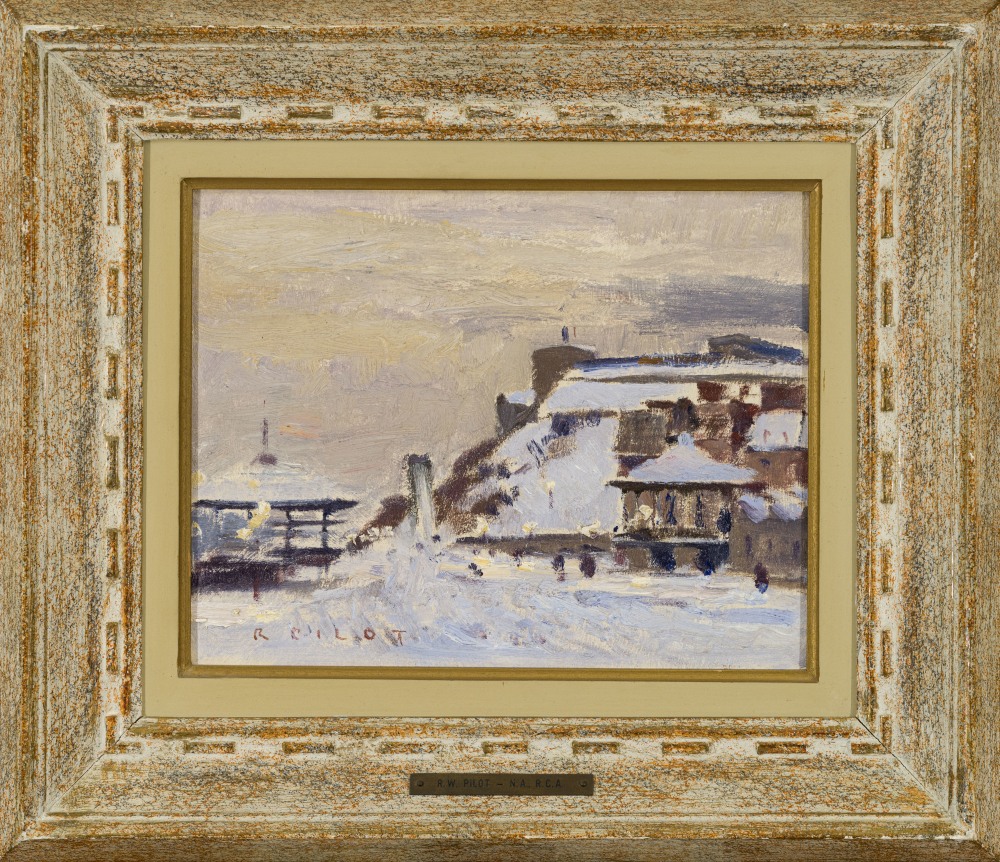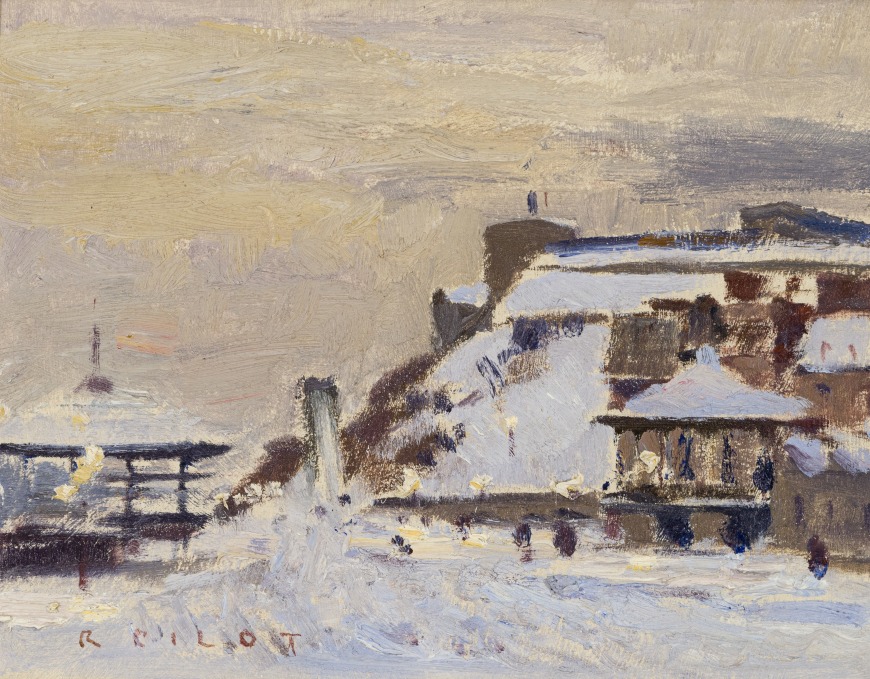20.3 x 26.7 cm
Inscriptions
signed, ‘R PILOT’ (lower left)Provenance
Private collection, Quebec
Sotheby’s Ritchie’s, Important Canadian Art, 31 May 2004, Lot 100
Private collection, Toronto
Heffel Fine Art Auction House, Fine Canadian Art, 23 May 2007, lot 007Galerie Walter Klinkhoff Inc., Montreal
Property of a Distinguished Montreal Collector
Exhibitions
Montreal, Galerie Walter Klinkhoff Inc., Important Canadian Art Exhibition, 15 May 2008.
Quebec City, winter fun on Dufferin Terrace
by Mario Béland
During the 1950s and 1960s, Pilot often painted Dufferin Terrace in Quebec City. The artist stayed at Château Frontenac, as shown in some low-angle views of the promenade, captured from one of the windows of the famous and luxurious hotel. [1]
The first Dufferin Terrace slide was built in 1884 and made permanent in 1946. The Château Frontenac skating rink, located on the edge of the promenade, was, for a long time, one of the capital’s most popular rinks.[2] From 1948 onwards, Pilot devoted himself to these scenes of winter fun on the terrace. In the 1950s, he exhibited six eloquently titled paintings on this theme at the AAM and the RCA. In 1955, the Montreal Arts Club presented a painting titled The Terrace Quebec – Twilight [3] to Sir Winston Churchill for his 80th birthday.
Painted in the manner of Camille Pissarro, a French Impressionist who was greatly admired by Pilot, these works appear closer to sketches made in the field, en plein air during the winter, than to studio paintings. This is evidenced in the first view of the terrace: the architecture of the citadel, slide, kiosks and other buildings, as well as the few figures—shapeless smudges—are only hinted at by gestural, impasto strokes. Much like Skating Rink Dufferin Terrace, it may have served as a preparatory study for finished paintings, such as those occasionally found in public sales. The predominant blue tones set off by broad brushstrokes in Night Skating, Quebec City are particularly striking, along with the depiction of a large music booth and the slide’s fence, illuminated by two of the promenade’s signature streetlamps. The rink is filled with colourful figures enjoying their favourite winter pastime. As shown in the 1968 retrospective exhibition catalogue (Night Skating, Quebec City, 1966, and Skaters, Quebec, 1967), Pilot explored this theme until his death. Adrien Hébert, in 1939 (private collection, Montreal), and Henri Masson, in 1944 (National Gallery of Canada), also painted ice skaters, but with very different approaches and aesthetics.
Mario Béland
Mario Béland holds a Ph.D. in art history from Université Laval and was curator of Art Ancien du Québec at the Musée national des beaux-arts du Québec from 1985 to 2014. He has curated, coordinated and collaborated on over 40 permanent or temporary exhibitions, some of which were accompanied by important catalogues and won prestigious excellence awards. His curatorial work includes monographs on sculptors Louis Jobin (1986) and Jean-Baptiste Côté (1996) and painters Antoine Plamondon (2005) and Napoléon Bourassa (2011). His thematic exhibitions include Painting in Quebec, 1820-1850 (1991–1992), Restauration en sculpture ancienne (1994), Les Génies de la mer (2001), and Québec et ses photographes, 1850-1908 (2008). Author of Marius Barbeau et l'art au Québec (1985) and a book on painter Eugène Hamel (2007), Béland has also published hundreds of articles, essays and notes in magazines, collective works and exhibition catalogues. A fellow of the Royal Society of Canada since 2009, Béland was the recipient of the Prix Carrière from the Société des musées du Québec in 2014, the Award of Distinguished Service from the Canadian Museums Association in 2016, and the Award of Excellence in the Professional category from the Conseil du patrimoine religieux du Québec in 2021.
______________________
Footnotes:
[1] See, for example, The Ice Rink, Dufferin Terrace, Quebec, circa 1960, Power Corporation of Canada collection, Montreal.
[2]As can be seen in photographs taken around 1925 and preserved at the MNBAQ (2018.155 and 160).
[3] It probably reminded him of the spectacular view he had from the citadel during the Quebec Conferences in 1943 and 1944.













